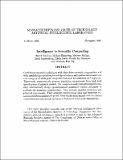Intelligence in Scientific Computing
| dc.contributor.author | Abelson, Harold | en_US |
| dc.contributor.author | Eisenberg, Michael | en_US |
| dc.contributor.author | Halfact, Mathew | en_US |
| dc.contributor.author | Katzenelson, Jacob | en_US |
| dc.contributor.author | Sacks, Elisha | en_US |
| dc.contributor.author | Sussman, Gerald Jay | en_US |
| dc.contributor.author | Wisdom, Jack | en_US |
| dc.contributor.author | Yip, Ken | en_US |
| dc.date.accessioned | 2004-10-04T15:13:07Z | |
| dc.date.available | 2004-10-04T15:13:07Z | |
| dc.date.issued | 1988-11-01 | en_US |
| dc.identifier.other | AIM-1094 | en_US |
| dc.identifier.uri | http://hdl.handle.net/1721.1/6501 | |
| dc.description.abstract | Combining numerical techniques with ideas from symbolic computation and with methods incorporating knowledge of science and mathematics leads to a new category of intelligent computational tools for scientists and engineers. These tools autonomously prepare simulation experiments from high-level specifications of physical models. For computationally intensive experiments, they automatically design special-purpose numerical engines optimized to perform the necessary computations. They actively monitor numerical and physical experiments. They interpret experimental data and formulate numerical results in qualitative terms. They enable their human users to control computational experiments in terms of high-level behavioral descriptions. | en_US |
| dc.format.extent | 4639934 bytes | |
| dc.format.extent | 1783364 bytes | |
| dc.format.mimetype | application/postscript | |
| dc.format.mimetype | application/pdf | |
| dc.language.iso | en_US | |
| dc.relation.ispartofseries | AIM-1094 | en_US |
| dc.title | Intelligence in Scientific Computing | en_US |
